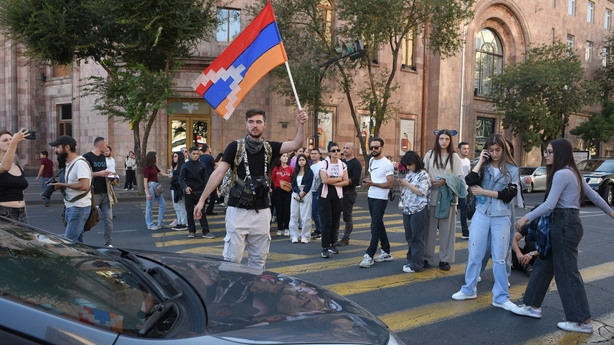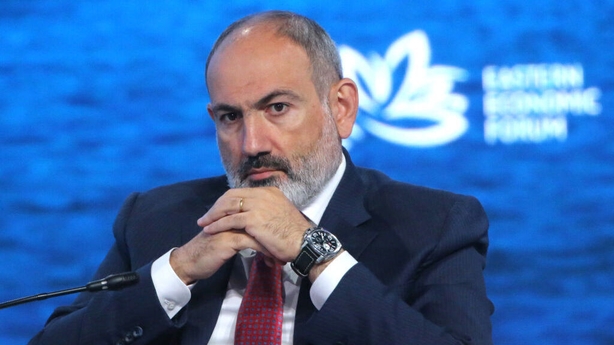Ethnic Armenians in Nagorno-Karabakh need security guarantees before giving up their weapons, an adviser to their leader has said, a day after Azerbaijan declared it had brought the breakaway region back under its control.
Karabakh Armenian authorities accused Azerbaijan of violating a ceasefire agreed yesterday after a lightning Azerbaijani offensive forced the separatists to agree to disarm.
Baku's defence ministry said the allegation that its forces had broken the ceasefire was "completely false".
Two sources in Karabakh's main city said they had heard heavy gunfire this morning, but it was not clear who was firing.
The shooting and the conflicting narratives highlighted the potential for further bloodshed despite a deal agreed 24 hours earlier that Azerbaijan said had restored its sovereignty over Karabakh after 35 years of conflict.
"We have an agreement on the cessation of military action but we await a final agreement - talks are going on," David Babayan, an adviser to Nagorno-Karabakh's breakaway ethnic Armenian leader Samvel Shahramanyan, said.
He said: "We need to talk through a lot of many questions and issues.
"There has not been a final agreement yet."
When asked about giving up weapons, Mr Babayan said his people could not be left to die, so would security guarantees first.
"A whole host of questions still need to be resolved," he said.
Talks took place earlier today in the Azerbaijani city of Yevlakh between Azerbaijan and representatives of the Republic of Artsakh, as the Karabakh Armenians call themselves.
The Artsakh authorities said in a post on Telegram that no final agreement had been reached.
Karabakh is internationally recognised as part of Azerbaijan but has enjoyed de facto independence since breaking away in a war in the 1990s as the Soviet Union collapsed.
Restoring control has been a cherished dream for Azerbaijan's President Ilham Aliyev, who launched a lightning military operation on Tuesday that quickly broke through Karabakh Armenian lines.
In a speech to the nation last night, he said Azerbaijan had triumphed with an "iron fist".
"After the surrender of the criminal junta, this source of tension, this den of poison, has already been consigned to history," Aliyev said, focusing his anger on Karabakh's leadership.
He said the region's ethnic Armenians would enjoy full educational, cultural and religious rights. All ethnic groups and faiths would be united as "one fist - for Azerbaijan, for dignity, for the Motherland".
Defeat is a bitter pill for the separatist Karabakh leadership and for Armenia, which helped its kin in the enclave to maintain their autonomy and fought two wars with Azerbaijan in the space of 30 years.
Armenian Prime Minister Nikol Pashinyan acknowledged in a speech to mark his country's independence day that Armenians were going through "untold physical and psychological suffering".

But he said that, to guarantee its survival, his country badly needed peace: "An environment that is free from conflicts, inter-state, inter-ethnic conflicts."
Azerbaijani President Ilham Aliyev said yesterday that Armenia's restraint in not trying to block Baku's offensive would remove an obstacle to peace between the two Caucasus neighbours. An aide to Mr Aliyev said Baku had given Yerevan a new draft peace agreement, Russia's RIA news agency reported.
Russia, which has peacekeepers in the region, also did nothing to stand in the way of the Azerbaijani offensive, a source of bitter resentment to many Armenians who looked to Moscow as an ally and protector.
In the Armenian capital Yerevan, thousands gathered on Wednesday to denounce their government's failure to protect Karabakh.
Many demanded the resignation of Pashinyan, who presided over defeat to Azerbaijan in a six-week war in 2020 that paved the way for this week's loss of Karabakh but nevertheless won re-election several months later.
In Karabakh, many ethnic Armenians have fled their homes in the past three days, some massing at the airport in the main city and others taking shelter with Russian peacekeepers.
Residents of Stepanakert, which Azerbaijan calls Khankendi, said there was no electricity, shops were bare, and people were lighting fires in courtyards to try to cook whatever food they could find. Authorities said they would hand out free food.
"There are a lot of displaced people from the villages, they were just moved to the city and had nowhere to spend the night," said Gayane Sargsyan, who runs a wellness business in the city.
In a voice message, she said that rumours were swirling about what would happen next and people were in "chaos and bewilderment".
Truce deal
Under the truce, the separatists said they had agreed to fully dismantle their army and that Armenia would pull out any forces it had in the region.
Azerbaijan's defence ministry said "all weapons and heavy armaments are to be surrendered" under the supervision of Russia's 2,000-strong peacekeeping force on the ground.
Both sides said talks on reintegrating the breakaway territory into the rest of Azerbaijan would be held on Thursday in the city of Yevlakh.
Russian President Vladimir Putin said Moscow's peacekeepers would mediate the talks.
Moscow said several members of its force in Karabakh were killed when their car came under fire.
Baku's operation was the latest violent confrontation over Nagorno-Karabakh.
After the Soviet Union fell apart, Armenian separatists seized the region, internationally recognised as part of Azerbaijan, in the early 1990s.
That sparked a war that left 30,000 people dead and displaced hundreds of thousands.
In a six-week war in 2020, Azerbaijan recaptured swathes of territory in and around the region.
President Aliyev said this week's events "will have a positive impact on the peace process between Azerbaijan and Armenia".
His foreign policy advisor Hikmet Hajiyev promised safe passage for the separatists who surrendered and said Baku sought the "peaceful reintegration" of Karabakh Armenians.
A separatist official said more than 10,000 people had been evacuated from Armenian communities in Nagorno-Karabakh.
Mr Putin said he hoped for a "peaceful" resolution, adding that Moscow had been in contact with all sides in the conflict.
The Russian leader held talks with Armenian Prime Minister Nikol Pashinyan Wednesday evening, but the Kremlin insisted the crisis was "Azerbaijan's internal affair".
'War is over'
Jubilant residents in Azerbaijan's capital expressed hope the deal heralded a definitive victory and the end of the decades-long conflict.
"I was very happy with this news. Finally, the war is over," 67-year-old pensioner Rana Ahmedova told AFP.
In Armenia, there was fury at a second defeat in Karabakh in three years.

Clashes broke out in the capital Yerevan, where thousands of protesters waving the separatist region's flag blocked a main road and riot police guarded official buildings.
Demonstrators threw bottles and stones at police as they slammed the government's handling of the crisis. Officers used stun grenades and made arrests.
The loss in Karabakh ratchets up domestic pressure on Mr Pashinyan, who has faced stinging criticism at home for making concessions to Azerbaijan since 2020.
"We are losing our homeland, we are losing our people," said Sargis Hayats, a 20-year-old musician.
Mr Pashinyan "must leave, time has shown that he cannot rule. No one gave him a mandate for Karabakh to capitulate," he said.
The Armenian leader has insisted that his government had not been involved in drafting the latest ceasefire deal.
Again denying his country's army was in the enclave, he said he expected Russia's peacekeepers to ensure Karabakh's ethnic-Armenian residents could stay "in their homes, on their land".
International pressure
Turkey, a historic ally of predominantly Muslim Azerbaijan that views mostly Christian Armenia as one of its main regional rivals, had called the operation "justified".
The EU and United States had been mediating talks between Baku and Yerevan in recent months aimed at securing a lasting peace deal between the two foes.
The White House said Wednesday it was concerned by the humanitarian situation in Nagorno-Karabakh, while French Foreign Minister Catherine Colonna warned of a risk of the crisis escalating into an all-out war between Armenia and Azerbaijan.
"As for the possibility that Armenia may, in spite of itself, find itself involved... I think we need to remind the international community to be highly vigilant."
